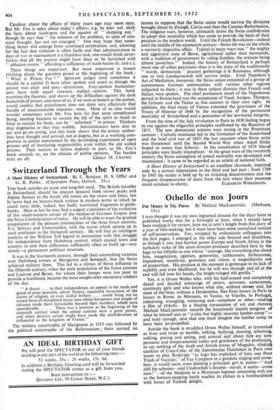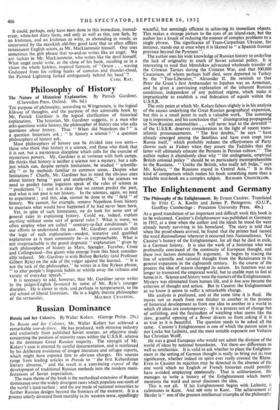Othello de nos Jours
I HAD thought it was my own ingrained distaste for the diary form in published works that for a fortnight at least, when I should have been reading it for review, kept me at arm's length from this diary of a year of film-making; but it must have been some unrealised instinct of self-preservation. For, whipped by enthusiastic colleagues into the first pages, I emerged at the other side bruised and breathless, as though I, too, had hurtled across Europe and North Africa in the turbulent wake of the actor-director-producer described here by the Iago to his Othello as one whose "courage, like everything else about him, imagination, egotism, generosity, ruthlessness, forbearance, impatience, sensitivity, grossness and vision, is magnificently out of proportion. His position at the moment is grotesque in its lack of stability and even likelihood, but he will win through and all at the end will fall into his hands, the bright-winged old gorilla."
Yes, it is Orson Welles who, with his half-crazed and completely dazed and &Med entourage of actors, actresses, cameramen, continuity girls and who knows what else, without money and, for most of the'time, without a Desdemdna, flies from luxury in Paris to luxury in Rome, to Morocco, to Venice, to Viterbo, to Portugal, rehearsing, wrangling, roistering and—somehow or other—making a film of Othello. In a blazing coruscation of wit and rhetoric Micheal MacLiamm6ir records the luxuriously lunatic progress of what he himself sees as "a chic but highly neurotic lumber camp"— and truly enough, save that one must imagine the lumber camp to have been jet-propelled.
Astride the book is straddled Orson Welles himself, as tyrannical as Ivan and twice as terrible, talking, bullying, coaxing, scheming, sulking, posing and acting, and around and about him are tem- pestuous and temperamental ladies and gentlemen of the profession, to say nothing of the Arab and Jewish extras of Mogador, clinking canikins of Coca-Cola; of the dipsomaniac Dutchman in Paris who wants to play Roderigo Iago has explicked of him, one Poor Trash of Vaynice;" of Fay Compton in a gondola singing and some- how, it would seem, even daridng a principal girl in panto—" And ahll the schemes—and Cinderellah's dreams—nevah, it seems—come trew!"—of the Madame in a Moroccan lupanar screaming with joy as the bottom-slapping battle reaches its climax in a bombardment with boxes of Turkish delight.
It could, perhaps, only have been done in this immediate, immod- erate, white-hot diary form, and only as well as this, one feels, by an Irishman, and an Irishman as witty, as abounding in words, as uncorseted by the mawkish old-boy good taste that so often afflicts reminiscent English actors, as Mr. MacLiammeir himself. One uses sometimes the glib phrase that so-and-so writes like an angel. We ' are luckier in Mr. MacLiammoir, who writes like the devil himself. What angel could write, at the close of his book, recalling as in a vision the whole feckless, inspired fantasia, of "Orson . . . waving Godspeed from his rolling banks of cumulus and thunder-cloud, the Painted Lightning forked ambiguously behind his head"? CYRIL RAY.



































 Previous page
Previous page